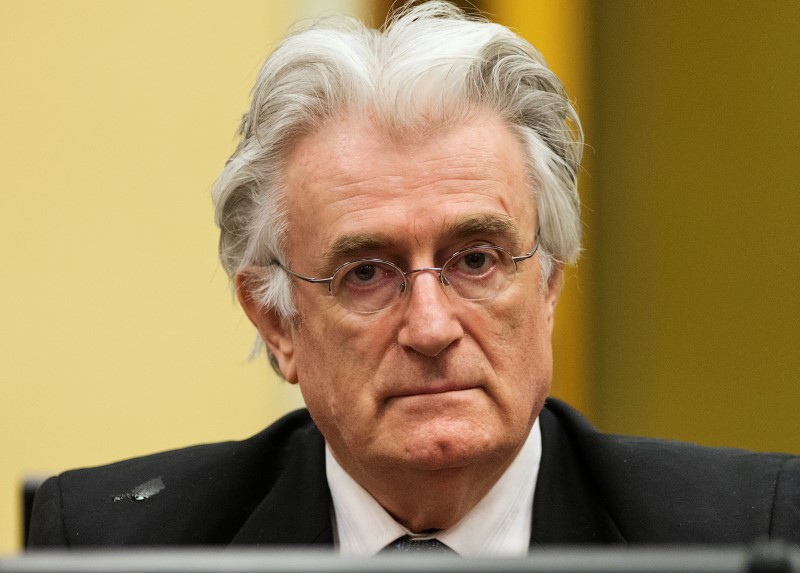By Gordana Katana and Daria Sito-Sucic
BANJA LUKA/PALE, Bosnia (Reuters) - Many Bosnian Serbs believe their wartime leader Radovan Karadzic is innocent of war crimes and that his possible conviction by a U.N. tribunal on Thursday would inflict a grave injustice on all Serbs.
Karadzic, first president of the self-styled Bosnian Serb Republic, has been charged by the Hague-based tribunal with 11 counts of war crimes and genocide committed during the 1992-95 war in which 100,000 people died.
He could face life in prison if found guilty, but his many Bosnian Serb supporters believe that would be a travesty.
"It would be realistic to set Radovan Karadzic free because he is a man who did not commit a single crime, nor did he order genocide against any people," said Goran Gajic, a war veteran from Banja Luka, capital of the Serb Republic, one of Bosnia's two autonomous regions.
Karadzic protested his innocence in a rare interview with the Balkan Investigative Reporting Network published on Wednesday.
"I know what I wanted, what I did, even what I dreamed of, and there is no reasonable court that would convict me," he told the website in an interview by email.
Among other charges, Karadzic is accused of orchestrating the 1995 slaughter of 8,000 Muslims after Serb forces seized the U.N.'s Srebrenica "safe area" in eastern Bosnia.
"The unnecessary killing of a single man is horrifying, let alone certainly several hundred at least ... Those who did it are the enemies of the Serbs first, then enemies of those families, then of the Muslim community," Karadzic said.
To Bosnian Muslims and Croats, Karadzic, who also faces charges over the shooting of civilians in Sarajevo, is synonymous with war, death and destruction.
Bosnian Serbs, however, view him as a national hero who created a Serb Republic - a state within a state, which survived under the 1995 Dayton peace agreement.
"Radovan Karadzic will always remain ... a hero who made an immense contribution to the creation of Republika Srpska and the defence of the Serb people," said Bozica Zivkovic Rajilic, president of the Bosnian Serb Association of Women Victims of the War.
SERBS ACCUSE COURT OF BIAS
Bosnian Serb nationalist leader Milorad Dodik, who rose to power with Western backing after distancing himself from the wartime leaders, now praises Karadzic's leadership, saying he did not order the crimes and accusing the U.N. court of bias against the Serbs.
"Somebody has concluded that Serbs need to be held responsible for everything that happened," Dodik told reporters last weekend, adding that Bosnian Muslim and Croat wartime leaders were not prosecuted. "That's why it (the verdict) has no element of justice, but of revenge."
Such sentiments are widely shared across the border in Serbia. "I don't think it (the verdict) will in any way help the reconciliation process which was the primary intention of the tribunal," Serbian Justice Minister Nikola Selakovic told state television RTS on Wednesday.
In Karadzic's wartime stronghold of Pale, 16 km (10 miles) from Sarajevo, people remember him for turning their mountainous village into a town after his supporters moved there from the Bosnian capital, which was besieged by his forces for 43 months.
"We are truly sorry for Radovan, our souls ache for him, who knows how enemies will judge him?" sighed pensioner Ljuba Vukovic, watching the defiant opening last weekend of a student dormitory in Pale named after Karadzic.
Whatever the verdict, some young people don't believe it will have a major impact on life in ethnically divided Bosnia, beset by corruption and economic difficulties.

"Whatever happens, the conditions in which we live will either remain the same - unbearable - or even worse," said Drazen Crnomet, a civic activist from Banja Luka.